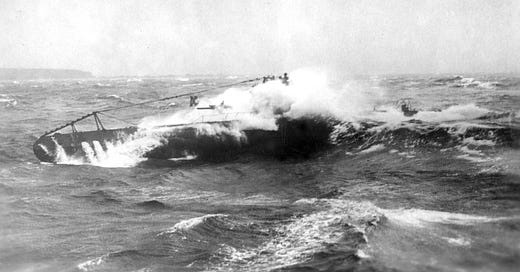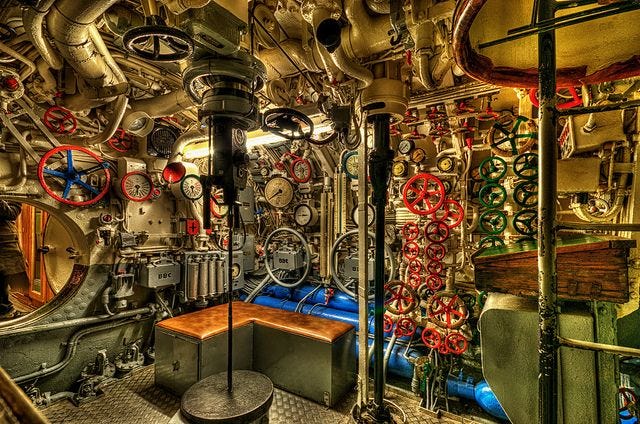It is November 1944, and we just crossed from the North Sea into the Great Channel. The sea is rough with the waves making crests that hit towards the metal of the U-boat. I was tasked with my Zeiss binoculars, to stand watch on top of the conning tower. The weather conditions are rough, with a drizzle of rain falling down onto the grey metal. It is difficult to spot anything with the binoculars, as the light conditions are dark. With the dark waves making it difficult to spot any vessel to hunt. The waves rock the U-boat slightly. I try my best to keep watch, despite it all, yet I am starting to feel cold and tired. Luckily soon my turn is up, and Hans takes over.
I continue to look through the binoculars, yet they weigh heavily, making it difficult to hold them up for long. Through the eye piece I see at first nothing but dark waves, with white foam forming at the crest. This is when nearby water splashes up starboard. An explosion? I am puzzled as where this came from. In a state of fear and panic I look, desperately with the binoculars. When I spot its source. A destroyer is moving through the waves, moving through the waves like a lone wolf stalking it’s prey. I use the speaking tube, and shout down that we have to dive. This is when another shot even closer hits now very close to starboard. The water splashes up and onto the conning tower. I drop my binoculars, and mere instinct taking over, I quickly make my way down the hatch into the U-boat. Hans who is the commanding officer is yelling commands, and we are starting to submerge. We can hear another explosion close to us while submerging.
The entire crew looks at each other with a look of trepidation and anxiety, yet with resolve. If we can manage to submerge deep enough we might make it. The diesel engine soon makes way to the electrical engine. In the control room, the crew sits staring at each other and at Hans. In the control room of the U-boat, tension hung heavy in the air as the crew gathered around Commander Hans. The room itself was a stark contrast to the tumultuous sea outside. Dimly lit by red bulbs, the walls were a chaotic network of cables, wires, and pipes. The metallic tang of machinery mixed with the faint odour of sweat and the dampness from the sea of my wet clothes.
Amid the urgency, the crew moved with practiced efficiency. Each station had its operator, their faces only illuminated by the soft glow of instrument panels. Gauges flickered and dials trembled as we descended deeper into the dark waters, seeking refuge from the destroyer above. Our commander, his voice calm yet resolute, issued orders that were swiftly turned into actions. The sonar operator listened intently for any sign of danger lurking in the depths, his headphones secured tightly over his ears. His expression focused with a hint of anxiety.
As the diesel engines gave way to the eerie hum of the electric motors, the atmosphere in the control room shifted subtly. Our expressions morphed from anxiety to focused determination, our eyes now fixed on the commander for reassurance and guidance. Each of us knew our role, yet the primal instinct for survival was very much alive amongst us. Outside, the sea rumbled with the fading echoes of explosions. The metallic clang of the hull reverberated through the cramped space as depth charges exploded ever closer. The crew's anxiety became palpable, etched on their faces despite their disciplined demeanour.
"Increase depth to 150 meters!" Hans commanded, his voice cutting through the din of machinery and the distant thuds of detonations. The sonar operator's eyes were glued to the pulsating green glow of the sonar display. "Depth charge, starboard side, 50 meters and closing!" he announced urgently, his voice tinged with fear and apprehension. We braced ourselves instinctively as another explosion rocked the U-boat, sending vibrations through the hull. The dim red lights casting eerie shadows across our faces. Hands gripped controls tighter, muscles tensed, and hearts raced with a sense of anxiety and adrenaline as the relentless onslaught from above continued. "Depth now at 180 meters!" the helmsman reported, his voice steady but with a sense of urgency and anxiety. The hull itself creaked under the pressure of the deep dive, protesting against the strain of the depth.
Meanwhile the depth charges continued to float down into the depths of the surrounding water, their explosions now uncomfortably close. Our commander's gaze went between the depth gauge, me and the crew, silently urging the helmsman on. "Maintain course and depth!" he ordered firmly. Minutes started to feel like hours as we held our breath, hoping to evade the destruction unfolding above. Yet, as suddenly as it had begun, the barrage of depth charges ceased. The only sound that remained was the steady hum of the electric motors and the distant rumble of the stormy ocean above. Slowly, cautiously, we exchanged glances, our faces filled with a sense of relief. Yet tempered by a lingering sense of anxiety at the fact that we had narrowly escaped the jaws of death once again.






I had based this back in primary school already of Das Boot, which I had seen. Now as well. From the little I remembered, and now also from other WW2 documentaries from various perspectives, that I remembered. The context of the story I had to write for primary school was, that it had to be set in a maritime context. I also happen to own similar type binoculars. Though British ones from WW1. So I know how heavy they are.